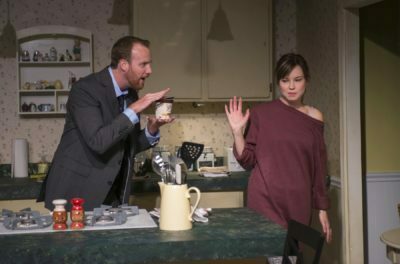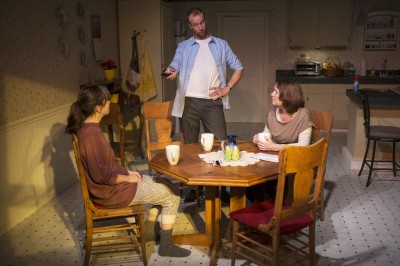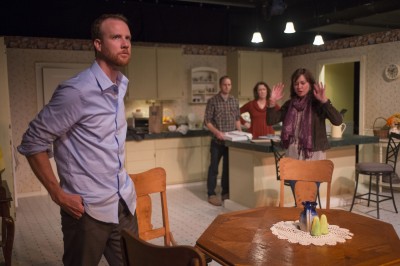Dead Accounts

By Theresa Rebeck
Directed by Jason Gerace
Produced by Step Up Productions
Dead Account¬ an account with no activity over a long period, such as one owned by a deceased person whose heirs have not given the bank any instructions.
Frustration with Religion and Materialism Continues
Step Up Productions launches its new season with Dead Accounts, a play about a Wall Street banker’s unexpected return to his Midwestern roots. It presents a few interesting ideas, but struggles to keep the surrounding package entertaining.
We open with Jack (Steve O’Connell), in his middle-class parents’ Cincinnati living room for the first time in years. He’s had a successful career as a broker and married into a rich patrician family, while his sister Lorna (Emily Tate) has stayed to care for their aging parents. Jack is behaving very oddly. He keeps buying tons of food, and won’t say why he’s left Manhattan, but he’s sure he’s never going back. This is an especially bad time for a personal crises because the father is fighting a life-threatening illness, and Lorna and her mother Barbara (Millie Hurley) are clashing more than ever. They never agreed on religion, which is at the forefront of Barbara’s mind now that death and danger are at the door.
Jack is feeling nostalgic for a childhood he can’t recreate, having lost track of most of his old friends and not kept up with the changes back home. He’s more willing to indulge Barbara’s Catholic traditionalism than Lorna, but he avoids visiting his father. He’s also alarmingly hostile toward any mention of his wife or in-laws, and accidently lets slip he’s getting divorced. His family wonders if there’s something on his conscience, and sure enough the estranged wife (Elizabeth Antonucci) shows up to accuse him of white-collar crimes.
The story isn’t a bad idea, but it needs more fleshing out. So many things are left undefined: what’s the relationship between Jack, Lorna, and their four other unseen siblings? How did a good, but not especially high-ranking data-enterer like Jack marry into the one percent and steal millions of dollars in a way nobody can prove? Does Barbara not get any support from friends at a church she’s been devoted to for half a century? This is another family drama in which most of the action already happened, except not that much actually happened.
O’Connell starts off the play with a huge amount of energy. It seems like Jack is on drugs, and we get hints he might be, which could also use some more explanation. But his random mood swings make him hard to understand or sympathize with, and O’Connell frequently starts scenes in such great agitation that adding more tension doesn’t change much. Tate shouts almost all her lines in the same angry, exasperated, contemptuous tone, except for a monologue about a tree. Yes, it’s frustrating to be the atheist feminist in a religious household during a crises, but she’s the same way in every scene. Antonucci is so stiff it’s impossible to imagine her character and Jack ever had a relationship. When this many actors all have the same problem, I have to wonder about Jason Gerace’s directing. The scenes also end too abruptly, though that’s Rebeck’s style.
I did enjoy Millie Hurley’s performance as the mother. Her annoying habits are funny enough for us not to hold them against her, and unlike the younger characters, she seems to possess the fortitude to cope with everyday calamities. Based on my past experience with Theresa Rebeck’s work, I’m sure it was not her intention to make Barbara the most likable character in the play, but that’s what happened here. Bradford R. Lund plays Jack’s friend Phil, the only connection onstage between the family and the rest of the world. His character is there just to be a decent guy, which he accomplishes. Eric Broadwater’s set design is a plausible representation of a middle-class house. Antonucci’s best moment is describing it over the phone with coastal-elite disdain.
This is a play about how both spiritual and worldly goals have disappointed the characters. If you’re interested in subjects like that, or enjoyed other plays by Rebeck, it could be worth checking out. There is a lot of humor in the story, which would probably work better with a regular audience than at the press opening I saw. But I, like the people in the play, was left wanting more.
Somewhat Recommended
Jacob Davis
Date Reviewed: October 7, 2014
For more information, go to Theatre in Chicago.
At The Den Theatre, 1333 North Milwaukee Avenue, Chicago.



